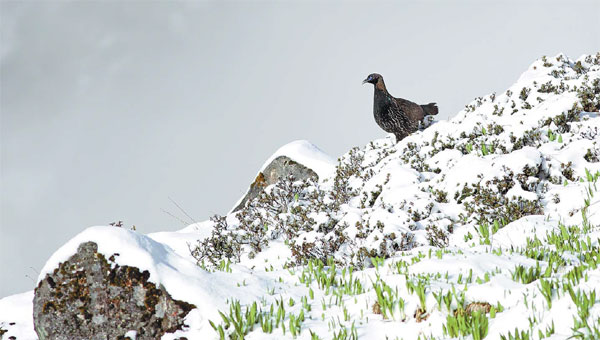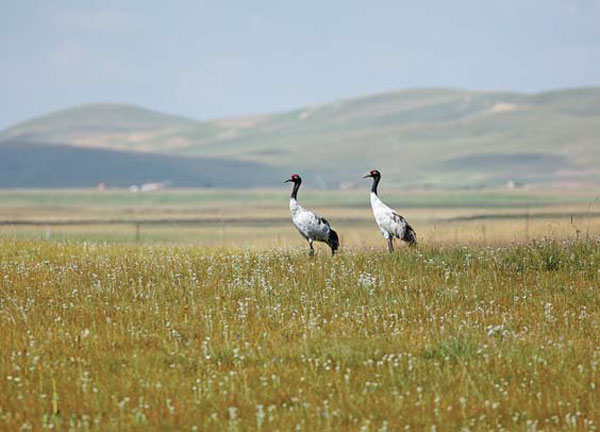Bird life
Updated: 2014-07-18 08:29
By Huang Zhiling (China Daily Europe)
|
|||||||||||

|
Black-necked crane (above) and Chinese monal (top) are among the rare birds that Shen You has photographed. Photos Provided to China Daily |
|
Shen You shares pictures he took of birds with a young bird lover in Chengdu, Sichuan province. |
Growing up in an impoverished family, Shen You would earlier capture birds to eat, but now he is a fierce protector of the creatures he has come to love
When he was a child, Shen You ate birds.
But now that he is 39 and president of the Chengdu Bird Watching Society in Sichuan province, Shen asks people not only to not eat birds, he discourages them from keeping birds or buying them only to set them free.
"The birds that people buy to set free are from the wild," says Shen. "People set birds free to atone for their sins or to accumulate virtue. But to procure one bird to set free, 25 birds will perish in the process of capture, transportation, breeding and sale," he says, while strolling Huanhuaxi Park in the suburbs of Chengdu, a haven for birds.
Shen was born in Yanxi village in Chongzhou, Sichuan. As a child he liked climbing trees to collect birds' eggs.
"My family was poor and short of grain for several months of the year. Birds meant a plate of delicious food," he says.
In 2002, Shen was deputy manager of a telecommunications company in Chengdu when he read a column on bird watching on wwfchina.org, the Chinese-language website for the World Wide Fund For Nature. He immediately became interested in bird watching.
Along with two other bird lovers, Shen took a telescope to visit all places in the city where birds could be observed. At first, he could only recognize sparrows and crows. Later, with the help of reference books, he could identify rare birds like firethroats and red-breasted geese.
In 2004, Shen and his friends launched the Chengdu Bird Watching Society. Shen quit his managerial job to work full time for the society.
The society has since hosted two major events, each involving more than 10,000 bird lovers who have counted birds across the city's major parks. It has sponsored bird-watching festivals around eight times, promoting knowledge of birds among children and young people, who observe birds with telescopes and take their photographs.
Shen and members of the society give lectures on birds in primary schools in Chengdu and take students to observe birds in forests and parks.
"They help students understand nature through birds so that they can love birds and protect them in their habitats," says Chen Tinggeng, a teacher in the Chengdu Paotong Primary School.
There are about 300,000 bird lovers in Chengdu thanks to the society. Shen's aim is to raise the number to 1 million.
"Sichuan ranks No 2 in China in terms of the number of birds and lags behind only Yunnan province," he says.
Many people in China consider birds a delicacy, but Shen says a sustainable way of protecting birds is to raise the income of local people. He cites Mengtun Valley in Lixian in Sichuan's Aba Tibetan and Qiang autonomous prefecture as an example.
The 2,700 people who live in the valley used to survive by hunting for food and chopping down trees for firewood. Their average annual income was about 2,000 yuan ($323).
As an increasing number of bird watchers and hikers started to visit the township, locals set up guesthouses and served meals to visitors. Realizing more birds and better ecology meant more visitors and income, they gave up hunting and logging, and started to work on protecting birds.
Last year, the annual average income in the valley skyrocketed to 11,000 yuan, thanks to the influx of bird watchers and hikers, according to Zhou Lizhi, an official in Lixian.
Bird watching in the wild can be dangerous. Shen was watching birds on a precipitous mountain in Mengtun in May, when a local farmer fell to his death from the mountain.
Despite hardship and danger, Shen spends more than one-third of the year watching birds in the wild and advocating their protection.
He visits the Zoige Grassland, a paradise for birds, in Aba almost every month.
Zoige has a speed limit of 80 kilometers per hour for drivers. But drivers used to race to speeds of 170 or 180 km per hour in order to run down birds.
Shen kept reporting the drivers until the local government installed 12 cameras to cover the grassland late last year, reducing the number of speeding vehicles.
Shen met his wife Meng Xiaofang, a fervent bird lover, when he was watching birds there in 2002. They married two years later.
Recently, their 5-year-old son Shen Yizhi completed his second visit to Zoige, where he took pictures of birds.
Shen says one has to cultivate a child's love of nature at an early age.
huangzhiling@chinadaily.com.cn
(China Daily European Weekly 07/18/2014 page28)
Today's Top News
Burning wreckage, bodies scattered after jet downed
US widens sanctions on Russia over Ukraine
Hamas agrees on 5-hr ceasefire
Chinese killed in Moscow metro derailment
Obama vows info co-op to Merkel
Filipinos flee as typhoon hits coast
China ends drilling operations in South China Sea
Economic ties with Latin America grow
Hot Topics
Lunar probe , China growth forecasts, Emission rules get tougher, China seen through 'colored lens', International board,
Editor's Picks

|

|

|

|

|

|







